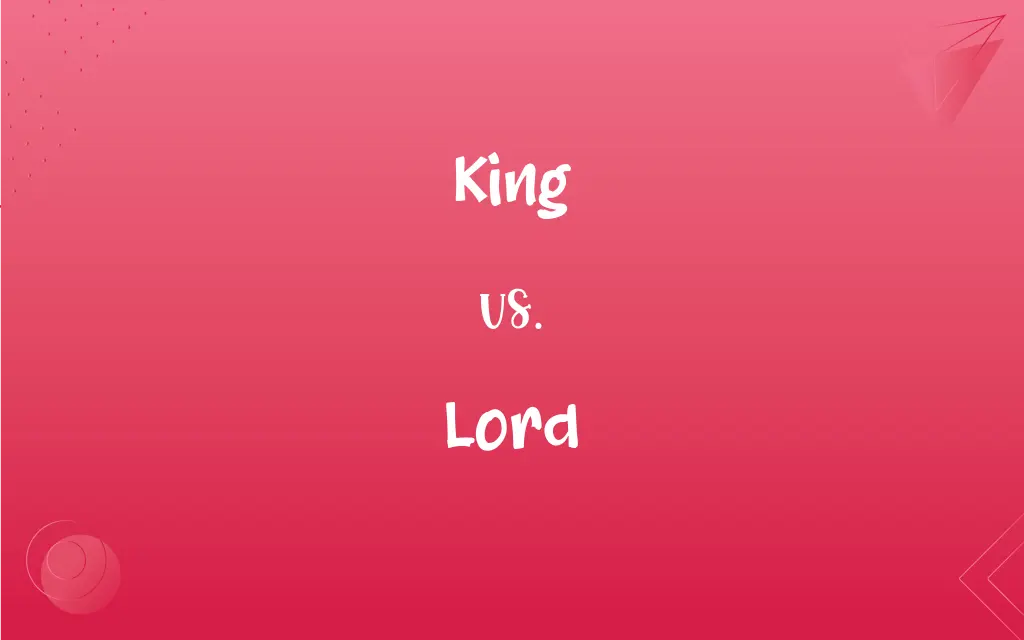King vs. Lord: What's the Difference?
Edited by Aimie Carlson || By Harlon Moss || Updated on November 7, 2023
A king is the male ruler of an independent state, while a lord is a nobleman or a person with authority, control, or power over others.

Key Differences
"King" and "lord" are titles of nobility and authority, but they occupy different ranks within a feudal system or monarchy. A "king" is the highest-ranking monarch in a kingdom, often the supreme ruler of the land with the ultimate authority over its people and territories. A "lord," on the other hand, is a general title that can denote various degrees of nobility, usually ranking below a king, and can often refer to anyone with control over a certain area of land or subjects.
In terms of power and governance, a "king" usually has sovereignty over an entire nation and represents the state at the highest level, with the authority to make laws, wage war, and administer justice. A "lord" typically has authority over a smaller area, such as a manor or fief, and may owe allegiance to a higher noble, including the king. While the king's rule is often hereditary and recognized by the crown, a lord's dominion might also be hereditary or could be granted by the king or a higher noble.
Historically, "king" has been a term associated with the ruler who inherits the throne by birthright or acclaims it through conquest, often anointed and coronated in a formal ceremony. A "lord" could be a duke, baron, earl, or any other noble who holds land, with the title sometimes granted as a reward for service to the crown, not necessarily associated with a formal ceremony of investiture.
The cultural and symbolic significance of a "king" extends beyond governance, often embodying the identity and unity of a nation, and is sometimes considered to be divinely appointed or chosen. A "lord," while respected and powerful within their domain, does not carry the same symbolic weight and is more so recognized for their local influence and land ownership than their national significance.
In literature and popular culture, "king" is often portrayed as a central figure with a grand narrative arc, representing the apex of power and authority. A "lord" is frequently depicted as part of the nobility, important within their own realm or context but subordinate to the king in the broader scheme of the story. The distinction between king and lord in such narratives emphasizes the hierarchical nature of their titles, with the king's character often being pivotal to the plot, while lords often fill the role of supporting characters.
ADVERTISEMENT
Comparison Chart
Rank
Highest-ranking monarch
Nobleman or person with authority
Authority
Over a country or large territory
May be limited to a specific area
Title Association
Crown and kingdom
Manor, parliament, or feudal system
Exclusivity
One per kingdom
Many within a kingdom
Historical Context
Sovereign ruler, often hereditary
Varying ranks, including non-hereditary
ADVERTISEMENT
King and Lord Definitions
King
A man who is the leader or has the highest rank in a society.
In the world of fashion, he was considered a king.
Lord
Someone with authority, control, or power over others; a master or ruler.
The medieval lords would rule over their manors with varying degrees of power.
King
A piece in chess of the highest importance and one that the opponent seeks to checkmate.
He moved his king to a safer position on the board.
Lord
A term of respect and form of address to certain officials, such as judges.
All rise for the honorable lord presiding over the court.
King
The male ruler of an independent state, especially one who inherits the position by right of birth.
King Louis XIV ruled France for 72 years.
Lord
In the UK, a man of high rank in the nobility or peerage, or a courtesy title given to a son of a duke, marquess, or earl.
The Lord of the manor is also a member of the House of Lords.
King
The most important or influential man in a specified area or field.
He was the undisputed king of blues guitar.
Lord
A name for God or Christ.
They offered prayers to the Lord every evening.
King
A person or thing regarded as the finest or most important in its sphere or group.
This hotel is the king of luxury and comfort.
Lord
A man of noble rank or high office; a nobleman.
The lords and ladies were invited to the royal banquet.
King
A male sovereign.
Lord
A king.
King
One that is supreme or preeminent in a particular group, category, or sphere
"In many countries, soccer is the king of sports" (Cameron W. Barr).
Lord
A territorial magnate.
FAQs
What powers does a king typically have?
A king often has the highest authority and governance over a sovereign state.
How does one become a king?
One usually becomes a king through hereditary succession or by being elected in elective monarchies.
Can a woman hold the title of lord?
In modern times, yes, although traditionally "lord" refers to a male, the female equivalent being "lady."
Is a king always a hereditary title?
Typically, yes, but kings can also be elected or assume power through conquest.
Is "Your Majesty" a proper address for a king?
Yes, "Your Majesty" is the correct formal address for a king.
What duties does a lord have?
Historically, lords managed lands, oversaw serfs or tenants, and provided military services.
Do lords still exist today?
Yes, lords still exist, especially in countries with a peerage system like the UK.
Is "Your Lordship" a proper address for a lord?
Yes, "Your Lordship" is a respectful form of address for a lord.
What symbolizes a king's authority?
A crown is a traditional symbol of a king's authority.
What is the role of a king in a constitutional monarchy?
In a constitutional monarchy, a king's role is often ceremonial, with limited political power.
Does a king have more power than a lord?
Generally, a king has more power than a lord, ruling over a larger territory.
What is a lord's domain called?
It is typically called a manor or a lordship.
How are new lords created?
New lords can be appointed by the monarch or inherit the title.
What's the difference between a lord and a baron?
A baron is a specific rank of nobility, while "lord" is a general term that can refer to various ranks.
Are all lords wealthy?
Traditionally, lords were among the wealthier classes, but this is not always the case today.
Can lords make laws?
In historical contexts and places like the UK, lords can have legislative powers.
Can kings be overthrown?
Throughout history, kings have been overthrown by rebellions, invasions, or coups.
Is the king's spouse also a ruler?
The spouse of a king may hold the title of queen but does not necessarily rule.
How do lords participate in government today?
In some countries, lords may serve in upper houses of parliament or perform ceremonial duties.
Did kings go to war?
Historically, kings often led their armies into battle or declared war.
About Author
Written by
Harlon MossHarlon is a seasoned quality moderator and accomplished content writer for Difference Wiki. An alumnus of the prestigious University of California, he earned his degree in Computer Science. Leveraging his academic background, Harlon brings a meticulous and informed perspective to his work, ensuring content accuracy and excellence.
Edited by
Aimie CarlsonAimie Carlson, holding a master's degree in English literature, is a fervent English language enthusiast. She lends her writing talents to Difference Wiki, a prominent website that specializes in comparisons, offering readers insightful analyses that both captivate and inform.































































